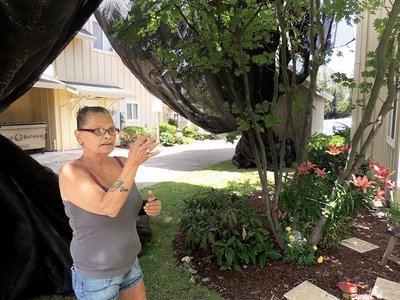Eugene company Glass Tree Care and Spray Service has had its license suspended and will face a fine following an investigation into the death of 5,000 bees after the company sprayed 17 blossoming linden trees at Jacobs Lane Apartments with pesticides, says Bruce Pokarney of the Oregon Department of Agriculture.
The company used imidacloprid, a neonicotonid pesticide linked to bee deaths. The city of Eugene banned the use of neonicotonids on all city property earlier this year, echoing a move made by the European Union last year after the correlation between pesticide use and colony collapse disorder became clear.
The ban on neonics in Eugene applies only to city-owned property, not to private or commercial property. In 2014 however ODA began requiring a label statement on pesticide products containing imidacloprid and dinontefuran, which the agency says the applicator should have been aware of, prohibiting the application of these products on linden trees and other Tilia species. Lisa Arkin of Beyond Toxics says some of the trees were city-owned
The original ODA estimate was about 1,000 dead bees, though by now the number has been upped to at least 5,000, Pokarney says.
Arkin disputes the necessity of the pesticide in the first place, since the linden trees were sprayed to kill aphids, which drop sticky sugar water onto cars parked below the trees. “There’s kind of an ethical question here: Should we be spraying a highly toxic insecticide to kill aphids that are not harming the tree and that turns out to be lethal to pollinators?” She adds, “I think another solution could be to not park your car under a linden tree, or put a cover on a car, or don’t plant linden trees in parking lots.”
Marguerite P. Sugg, a resident of Jacobs Lane Apartments, says she swept up about half of a freezer bag full of dead bees, and saw moths, butterflies, ladybugs and yellow jackets intermixed. “I know they had to spray to keep the sidewalk clean because [otherwise] its nasty and sticky, but I never realized that spraying that would kill the bees,” Sugg says. “I would rather rinse my sidewalk off than put poison in the trees. Now I don’t have any honeybees to come to my flowers.”
Jacobs Lane Apartments is run by Housing and Community Services of Lane County.
Although mass bee die-offs such as this one and the 50,000 die-off in Wilsonville last year sound the pesticide alarm, Arkin says that it’s important to realize how sub-lethal doses of pesticides also negatively affect pollinator survival. A recent study by Friends of the Earth found that 51 percent of plants bought at large garden retailers in 18 cities in the U.S. and Canada contained neonics, which could directly contribute to bee deaths and colony collapse.
The trees have been covered in shade cloth to prevent the bees from harvesting more pollen until the linden blossoms dry up. The company has apologized to the city of Eugene and Lane County.
